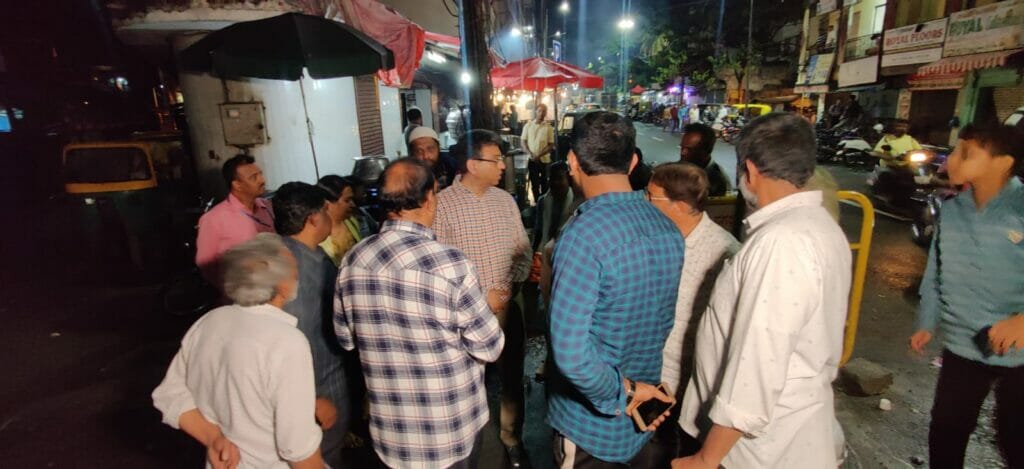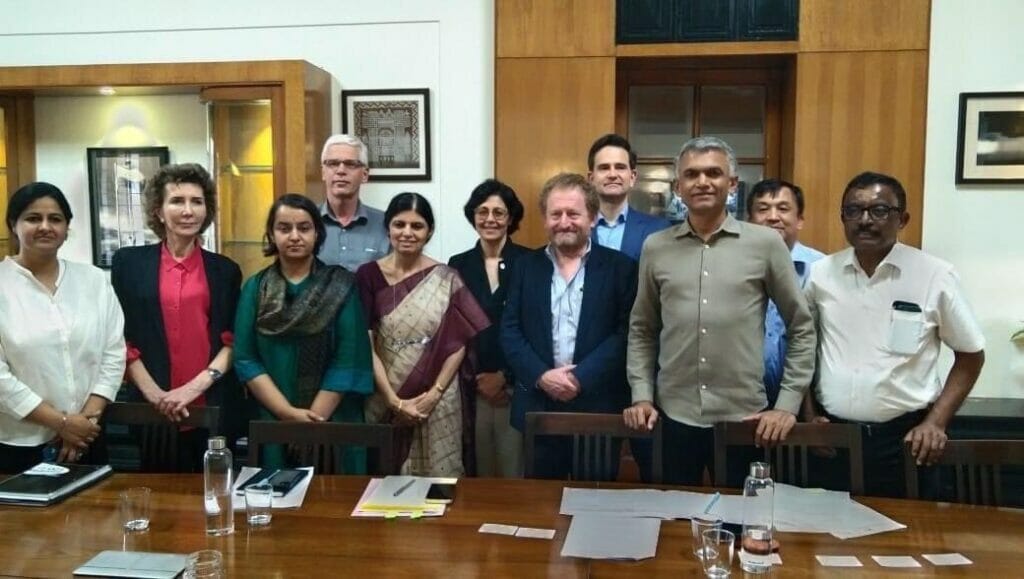As Bengaluru expands, civic agencies like BBMP and other parastatal bodies like BWSSB struggle to meet citizens’ demands for better infrastructure. We spoke to urban governance researcher Neha Sami, from the Indian Institute for Human Settlements, about Bengaluru’s governance model in a two-part interview. In part one, Neha stressed the need for stronger local government and better public consultation for an equitable city.
In part two, she outlines how the increasing private sector influence in governance, planning and finance can further weaken local governments. She also spoke about why private sector involvement might become important in some cases and how civic agencies like the BBMP can use it to build capacity within local government.
Excerpts from the interview:
CM: Many citizens perceive the government as inefficient and lacking in knowledge. This is often the basis for at least a section of society supporting private sector involvement in urban governance and planning. But in your 2017 paper, you wrote that this involvement can reduce capacity in the local government. Could you tell us a little about this?
NS: This is not a new idea. I think it was sometime in the early 2000s that there was a headline in the Times of India: “If a CEO runs your city.”
There is no denying that there are inefficiencies in the government and there are people who are not fulfilling their responsibilities. The immediate solution to that doesn’t have to be the involvement of the private sector. It is not an either-or situation. Smart Cities, JNURM and AMRUT, were well-meaning interventions that were needed to bring in more knowledge and better ways of doing things.

So, let us bring in some of the methods of the private sector into the functioning of government. Unfortunately, that has led to two things. One, because of bureaucracy and constraints in sourcing, hiring, etc. within the government, it has become easy for governments to bring in external consultants.

Due to this, what the government does is increasingly just supervisory, especially at the planning stage. The planning is now completely given to consultants. The government still does the overall framework, but the process of making the plan is outsourced. A lot of these consultants have a fixed format for these plans, but it is not necessarily contextual.
Bengaluru’s requirements are different from other cities. Cookie cutter plans can end up in a mismatched plan for the city. This happens because private consultants are often not embedded in the local context and are not able to understand the challenges or the local history. There is no institutional memory, where you can build on earlier plans or incidents.
[Editor’s note: For instance, BDA hired the Netherlands consultant group Royal Haskoning DHV to create the much-criticised Revised Master Plan (RMP), 2031. The plan was dropped but the same consultant firm was hired in 2021 to redo the RMP 2041. This contract was also dropped last year.]
Secondly, it is a public function when the government does something like this. The motive is overall public welfare, which can be interpreted as economic growth, environmental well-being or social justice. The idea, eventually, is public good. Private consultants usually function from a profit motive and their thinking typically is “I am going to finish this and move on to the next thing.”
Read more: Private sector influence dilutes Bengaluru’s local government authority: Prof. KC Smitha
The motives are different for each player. So, there is no long-term accountability because that eventually lies with the government. If, for example, there is litigation around a project and it takes a while, no private consultant is going to wait for three years or five years to get a consensus. It is the government’s responsibility to sort all that out. The process then just breaks down because you hire someone to do a particular task for you, they don’t do the task, and then they are gone.
The emergence of private consultants is also concerning because it is a particular type of private consultant. If it was a more broad-based set of private stakeholders, for example, rights groups and environmental organisations, it wouldn’t be as much of an issue because multiple voices are included.
CM: Engaging private consultants in the planning process is an issue. But in what other ways can private players be of concern in city governance?
Private players can also have an indirect involvement in emerging settlements or neighbourhoods in cities or industrial corridors. Increasingly, we see more players in governing bodies. For instance, when you have an industrial township being set up, you end up having industry leaders or consultants be part of these development authorities with the idea that they will eventually rotate off. But that rarely happens. This bypassing of elected representatives is quite frightening in a democracy. It is quite worrying if you have parastatals, on the one hand, like the BDA, planning for cities and other development authorities being set up as a kind of mode of governing for emerging towns. Because then what is the role of the elected representative?
CM: Is it also fair to say that the private sector pushes the focus of the government or the limited resources towards certain types of projects? For instance, roads over say primary healthcare?
NS: I think that depends on who you ask. If you bring in industry leaders, they will tell you about the kinds of challenges that they are facing, but it is on the government to also talk to small-scale manufacturing industries or the textile industry in Bengaluru, besides IT. The problem is not listening to one type of stakeholder, the problem is listening only to them. That is what happened with the Bangalore Action Task Force (BATF). It was a singular voice that tried to speak for the entire city. It was well-meaning but it was just one voice that represented one section of the population and economy.
For instance, the Delhi metro, which you might think is potentially an elite project, has made a huge difference to a lot of working-class communities. So, even though it has been more expensive, it saves people a lot of time. Even if we think of a project as elitist, it doesn’t always translate into that. But in the Bengaluru case, it is worth asking if investing in the Metro means a reduction in bus transport. However, to figure out those trade-offs, you need to talk to the people who use the bus system most.
CM: Is there a way for local governments to use private consultants in urban planning? Because they do often have specialised knowledge, right?
NS: Absolutely! I think IIHS is one such private consultant. Our approach is very different because we don’t do the implementation. We are effectively a teaching and learning institution. Everything we do is to build capacity within the public sector and then we step away from it. So, if you need specialised knowledge come to us. We understand that it is not up to the government to know everything. For example, if you need environmental planning, right now there is no environmental planning architecture at the city scale. We only have pollution control boards, which are also managed at the state level. But it is also not fair to expect anyone at the BDA or BBMP to become environmental planners without building capacity. But Bengaluru has IIHS, IISc, EMPRI, and many other research institutions that have specialised knowledge. Reach out to us. We’re more than happy to help turn that knowledge into policy.
CM: You have mentioned that there are limited resources and that is a big reason for private players to become involved in urban governance. What is your take on international financing for local government? For instance, the World Bank is giving a loan of Rs 3,000 crore to fix stormwater drains in the city.
NS: Honestly, right now, governments are terribly cash-strapped. They have to look elsewhere for funding. This can be done in multiple ways. It can be done by handing over certain services to the private sector, for example, electricity or telecom are largely private in cities. But in terms of international financing, it is important to think about what it comes with. For example, the 1991 liberalisation was a condition imposed by the IMF when they were bailing out India. We were lucky to have a finance minister who was able to manage that process and not let it be a floodgate. The economy opened up gradually.
For municipalities, it is important to understand the cost of having a loan like that. For instance, the IMF- imposed liberalisation propelled the 74th Amendment. And that is not a bad thing, in principle, but we haven’t implemented it. And so what we ended up with is a half-baked situation in local government.

Another issue is that loans come with a lot of conditions. For example, JICA loans come with the condition that 30% of the contracts have to be awarded to Japanese companies. We want investment as well. We want to grow our FOREX pool. But it is worth thinking through the cost as well.
Read more: Why BBMP is caught in a vicious cycle of low municipal revenue
CM: This stuff is really complex. Can any government make sure that everybody understands what we’re getting into and keep all citizens in the loop?
NS: Some of it is possible, I think. But, importantly, I don’t think the public will fundamentally disagree with these loans. Frankly, very few people care where the money is coming from, because eventually, people care about it only at a personal level. Is it going to show up on my tax bill? Am I paying for it? If yes, what service am I getting?
I think it is useful to explain that when we do this project, this is what we are doing. These are benefits. These are the costs. A lot of this information is available through RTIs or about Word Bank funding on their website. But not everyone is necessarily interested in knowing. And it is one thing to put the information out there and make it public. The other part of it is what would you, as a citizen, do? If you heard that your stormwater drains are being funded by the World Bank and not by the government, would that make a difference?
CM: But you also said loans have consequences? What if paying a loan taken to provide one service, means cutting funding for another? Shouldn’t the public understand that?
NS: At that point if It means you are taking the money out of another service. That is what I mean by saying communicate the consequences of these actions or funding sources.